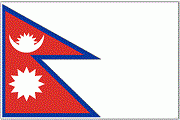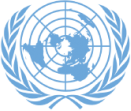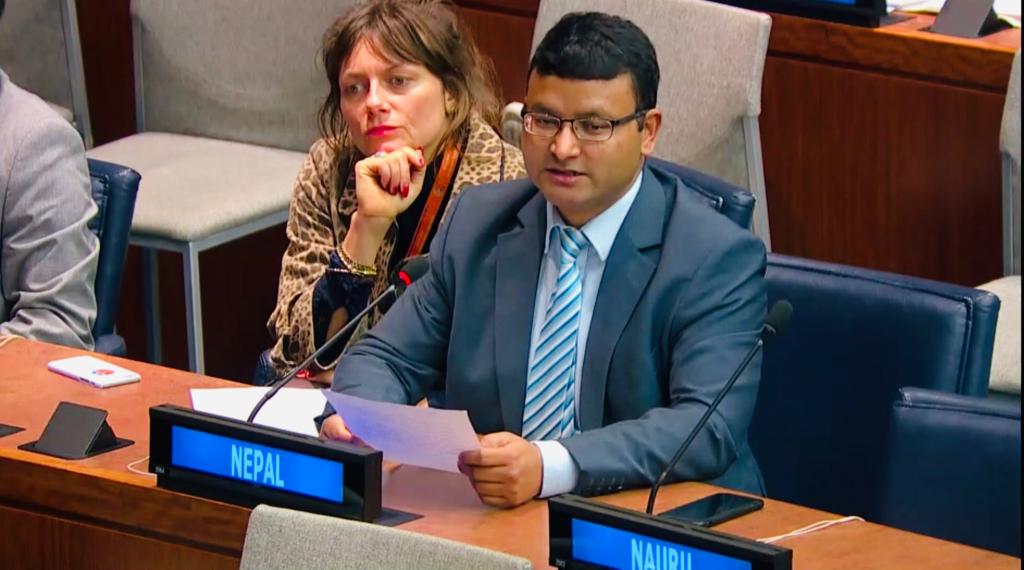Mr. Chairman,
Allow me to join other delegations in congratulating you and other members of the bureau on your respective elections. I assure you of the full support of my delegation in your endeavors towards a fruitful conclusion of the current session.
My delegation aligns itself with the statement delivered by the distinguished delegate of the State of Palestine on behalf of the G77 and China.
My congratulations also go to Ms. Melissa Fleming, for her appointment as the Under-Secretary-General for Global Communications (DGC). I thank her for her remarks on the activities of DGCs, yesterday.
Nepal welcomes the recent reforms in the DGC with the hope that these efforts will make the department more agile and proactive to meet the demand of rapidly changing global information landscape.
Nepal appreciates the task of DGC in promoting the 2030 Agenda for Sustainable Development across its platforms and through global and local media and community outreach. Its new initiative of using artificial intelligence to promote climate action through 'ActNow' bot is commendable.
Mr. Chairman,
Nepal also appreciates DGC for its endeavor in promoting the contribution of the UN peacekeepers in the maintenance of international peace and security. In this regard, Nepal appreciates the success of the second phase of the multilingual multimedia campaign entitled “Service and Sacrifice” which achieved greater public recognition of the individual contributions of peacekeepers. We also thank the Department for recognizing the service and sacrifice of Nepali peacekeepers through this campaign.
The work of DGC in promoting multilingualism is commendable. The UN Information Centres (UNICs) are the effective vehicles of the DGC for reaching out to the global population in their own languages. Last year, the UNICs, located around the globe, published information in 97 languages, as well as in Braille.
We commend the UNIC in Kathmandu for disseminating information in Nepali and Newari languages spoken in Nepal. We will appreciate the inclusion of other local indigenous languages in the UN's basket of languages. Such an endeavor will ultimately widen the constituencies in favor of the UN.
Nepal believes these Centres should be further strengthened with technical and infrastructural capabilities. Similarly, stronger synergies must be created among them to ensure the efficient use and maximum impact of these Centres.
The Central Library of the Tribhuvan University, Nepal’s designated repository for the UN publications, is engaged in disseminating relevant information to university students, intellectuals and researchers. Such repositories need further modernization and strengthening to intensify their outreach activities to reach the unreached.
Mr. Chairman,
Nepal encourages the DGC to continue its engagement with young people by creating more focused information and youth-friendly tools. Despite the growing popularity of the new media among the younger generation, their availability and accessibility in the LDCs arehindered by poor technical capacity and higher economic cost.
In the remote parts of the LDCs, the traditional means of communication like radio, television, and printed materials continue to be the primary source of information. The UN should utilize the right mix of traditional and new media in disseminating the principles and activities of the UN to the global public.
Nepal appreciates the engagement of DGC in forging meaningful partnerships with educational institutions, NGOs and civil societies. Such partnerships help promote the work and priorities of the United Nations at the local level.
We urge DGC to consider making the current telephone access to UN materials free of charge through designated toll-free telephone numbers, to the public from all over the world. We believe the global outreach of audio coverage resulting from such a step, accompanied by due publicity, could make a significant impact on the ground, benefitting people in all corners of the world with free and easy access to the UN materials.
Recently, the UN Information Centre in Kathmandu supported the first Mount Everest expedition of women journalists, which was aimed at raising awareness of the SDGs and gender equality. Similarly, the SDGs have taken new heights in Nepal with Yeti Airlines- a private airline company- painting SDGs on its aircrafts. These activities show the role of the private sector in spreading the message of SDGs to the public at large.
Similarly, this April, the Permanent Mission of Nepal organized an exhibition entitled ‘Art for SDGs: the Mithila Heritage’ at the UN Headquarters in New York. The paintings depicted 17 SDGs as well as Mithila themes of love, nature, harmony, and beauty.
To conclude, Mr. Chair, Nepal attaches great importance to the role of information which promotes transparency and accountability towards its constituencies. It is more important to a multilateral organization like the UN to be more transparent and accountable through disseminating information. I reiterate my delegation’s commitment to supporting the UN in enhancing its transparency and accountability towards its constituencies through the dissemination of information.
I thank you.



